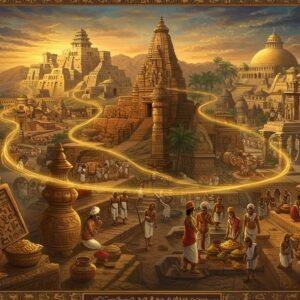
South India’s rivers are not mere geographical features; they are the lifeblood of the region, deeply intertwined with its culture, spirituality, and economy. These waterways hold a rich history and profound significance in various traditions. Understanding these rivers allows us to appreciate their impact on the lives of millions.
The Majesty of South Indian Rivers
The major rivers of South India, including the Krishna, Godavari, Kaveri (Cauvery), and Mahanadi, have played crucial roles in agriculture, economy, and culture, supporting civilizations for millennia. The Krishna River stands as one of the longest, boasting the largest basin area in South India. It originates near Mahabaleshwar in Maharashtra and concludes its journey in the Bay of Bengal. South Indian rivers are primarily seasonal, relying on monsoon rains, with the exception of the Cauvery. The Cauvery is considered perennial due to receiving rains from both North-East and South-West monsoons.
The Godavari: South India’s Longest River
The Godavari holds the title of the longest river in South India. Its journey begins in the Western Ghats of Maharashtra and meanders through several states before finally merging with the Bay of Bengal. This river is a lifeline for agriculture and plays a vital role in the region’s economy. Numerous temples and rituals are connected to the Godavari, highlighting its spiritual importance. However, challenges such as pollution and water management issues threaten its health. Ongoing efforts strive to preserve this vital waterway, ensuring it continues to nourish the land and its people.
Other Significant Rivers of South India
South India is blessed with a network of important rivers, each with its own unique characteristics and regional influence:
- Krishna: Known for its extensive irrigation systems, supporting vast agricultural lands and contributing significantly to the region’s food production. It also holds cultural significance, with several historical and religious sites located along its banks.
- Kaveri: Revered for its cultural festivals and spiritual significance, the Kaveri is a source of life and inspiration for millions. Its waters are crucial for agriculture, and its course is dotted with ancient temples and pilgrimage sites.
- Tungabhadra: Famous for the historical sites and ancient ruins that line its banks, the Tungabhadra offers a glimpse into the rich past of the region. This river also plays a role in irrigation and supports local communities.
- Penna: Supporting diverse ecosystems and a variety of flora and fauna, the Penna River contributes to the region’s biodiversity. It also provides water resources for agriculture and other human activities.
These rivers are not just water bodies; they are integral to the cultural and historical fabric of South India, with festivals, pilgrimages, and local legends woven around them. They also play a crucial role in maintaining the region’s rich biodiversity.
Mapping South India’s River Systems
A detailed map illustrating the courses of South India’s rivers, intersecting major cities and landmarks, is a valuable tool for understanding the region’s geography. Geographical features influence the paths of these rivers, shaping the landscape and impacting human settlements. Such maps are useful for educational purposes, travel planning, and resource management.
Cultural and Spiritual Significance of the Rivers
Rivers in South India hold a central place in cultural and spiritual practices. Rituals, festivals, and ceremonies often unfold on their banks, connecting people to the sacredness of water. Temples located near these rivers often have historical and religious significance, adding to the spiritual aura of the region. Stories and legends passed down through generations enrich local traditions and beliefs, further strengthening the bond between the people and their rivers.
You can find puja items for honoring the rivers at poojn.in.
Economic Impact of South Indian Rivers
South India’s rivers significantly impact agriculture, industry, and daily life. They are the primary source of water for irrigation, fueling the region’s agricultural prosperity. Fisheries and other industries also depend on these rivers for their livelihood. Proper water management is essential to sustain these economic benefits and ensure equitable distribution of resources.
Environmental Concerns and Conservation Efforts
Environmental challenges such as pollution, climate change, and over-extraction pose serious threats to South India’s rivers. These issues impact the delicate ecosystems and the communities that rely on these waterways. Conservation efforts are crucial to protect these vital resources. Government policies, community involvement, and sustainable practices are essential for successful conservation and the long-term health of the rivers. Learn more about Hinduism’s sacred relationship with nature.
Honoring South India’s Lifelines
South India’s rivers are more than just bodies of water; they are lifelines that sustain culture, spirituality, economy, and the environment. From the mighty Godavari to the revered Kaveri, each river plays a unique and vital role. Understanding and respecting these rivers is essential to appreciating their profound impact on the lives of millions. As we face modern challenges, it is our collective responsibility to protect and preserve these precious waterways for generations to come. Let us honor these rivers, cherish their legacy, and work together to safeguard their future. Find everything you need for your puja rituals honoring these sacred rivers at poojn.in.
Learn more about the Tunga River and its spiritual significance.
Embark on a spiritual journey to Sringeri, Karnataka.


